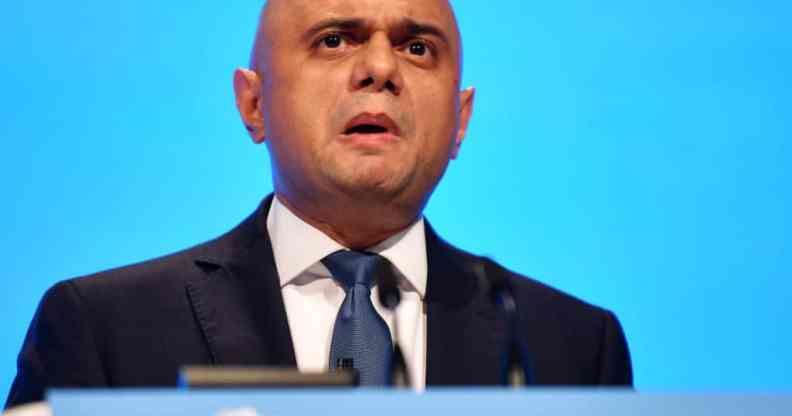Tory government’s long-awaited HIV Action Plan ‘isn’t enough on its own’ to end transmissions

Sajid Javid speaks on day two of the 2019 Conservative Party Conference at Manchester Central on September 30, 2019. (Jeff J Mitchell/Getty)
HIV charities have tentatively welcomed the UK government’s HIV Action Plan, which sets out how England can end HIV transmission by 2030 – but some have said the plan doesn’t go far enough.
The government unveiled its plan on 1 December, World AIDS Day, which sets out how England can achieve the goal it set in 2019 to reduce HIV transmission by 80 per cent by 2025 and to have no new cases by 2030.
As part of the plan, the government announced that it will invest £20 million to expand opt-out testing in emergency departments in areas that have the highest prevalence of HIV in England.
The plan notes that transmission can only be ended if people with HIV are diagnosed early. This means they will be provided with antiretroviral treatment, which reduces the viral load in a person’s bloodstream to an undetectable level.
Effective treatment enables people with HIV to live a full lifespan. It also prevents them from passing the virus on to others.
The government’s goal is to reduce the number of people newly diagnosed with HIV in England from 2,860 in 2019 to under 600 in 2025.
It aims to achieve this through a number of measures, including launching a National HIV Prevention Programme, which will run from 2021 to 2024.
The government will also deliver an annual national HIV testing week, which will aim to get 20,000 people at higher risk of contracting HIV tested for the virus.
“As new infections reduce, they become harder to find, so we will need to continually adapt and evolve our strategy, tailoring our efforts to new groups and needs,” the plan says.
The Department of Health and Social Care also promised to invest in PrEP (pre-exposure prophylaxis), a medication that prevents people from contracting HIV. It said it will work to improve access to key groups “in settings outside of sexual and reproductive health services”.
‘Stigma-free’ testing is essential to end HIV transmission by 2030
The Elton John AIDS Foundation welcomed the plan. In a statement, the charity said the goal to end HIV transmission by 2030 is “entirely within reach”.
“[The plan] crucially leads with £20 million of new funding for opt-out HIV testing to find those who are living with HIV and unaware of their diagnosis in places with the greatest need,” the charity said.
“The clear data from Elton John AIDS Foundation’s world first HIV Social Impact Bond (SIB) shared compelling evidence with the UK government from the last three years on the importance of opt-out HIV testing in emergency departments and GP practices, particularly in finding people who are not using other services that would provide an HIV diagnosis.
“Through the SIB, we have found 200 individuals living with HIV in three boroughs of South London from this model. This innovation has shown that stigma-free testing options provide results and connect people to care.”

University students display red ribbons during an event to promote the awareness of AIDS at the Sichuan University on World AIDS Day 2009. (China Photos/Getty)
The organisation said it looks forward to working with the government to achieve the goals set out in the HIV Action Plan.
“Now, we need improved at-home testing, PrEP provision in primary care, better post-diagnosis support and an enhanced focus on the health inequalities and stigma which continue to exacerbate HIV to ensure the life-changing goal is achieved.”
In a statement, Elton John said: “Today’s news of the UK government’s commitment to provide £20 million to opt-out HIV testing underscores how critical the Elton John AIDS Foundation’s Social Impact Bond in south London has been over the past three years and we’re proud that this life-saving work for vulnerable communities will continue across the country.”
There is ‘much more to do’ to make the government’s goal a reality
Ian Green, chief executive at the Terrence Higgins Trust, welcomed the government’s plan to invest £20 million to bring opt-out testing to emergency departments.
“There’s clear evidence that an opt-out approach to HIV testing makes a big impact in driving up testing rates and finding those living with undiagnosed HIV,” Green said.
“Today’s £20 million for opt-out testing in A&E in areas with the highest prevalence of HIV is therefore a vital step as we target the end of new HIV cases by 2030 in the UK.”
Green pointed out that the investment marks the first time in almost a decade the government has spent money on ramping up HIV testing. He said it “keeps alive” the government’s commitment to end transmission by 2030.
However, he said there is “still so much more to do to make it a reality”.
“To really get on track, we need to see opt-out testing scaled up across the country to ensure equitable progress in more areas, alongside training for those involved.
“Ramping up HIV testing isn’t just about numbers – it’s about addressing the inequalities that continue to exacerbate the HIV epidemic and ensure we see progress across all groups, including those traditionally most impacted by HIV. Thats why we strongly welcome the action plan’s signal of intent to ensure free HIV test kits to do at home are available across the country – this needs to be available all year round and accessible to all who could benefit.”
Green went on to say there is still “much, much more” to be done to expand access to PrEP beyond gay and bisexual men living in major cities.
“The action plan doesn’t go far enough on this. We need to take PrEP and wider HIV prevention to people via primary care, including community pharmacies and GPs. Only then will we reach women and ethnic minority populations, for example. This needs to urgently be piloted and we know community pharmacists are keen to do so.”
Green added: “Today is a step change but there’s still a long way to go before we can say we’re throwing everything we’ve got at our HIV target. Including the funding and actions to back up the vision.”
HIV Action Plan ‘won’t be enough on its own’ to end transmission
Meanwhile, the National AIDS Trust said the plan represents a step in the right direction – but it said there is more to do if the government’s targets are to be achieved.
The charity said the key goals mark “a substantial step in the right direction”, however, it said it is clear the plan “won’t be enough on its own to get us to our shared goal of ending HIV transmission by 2030 – a goal that is completely reachable.”
A National AIDS Trust spokesperson said: “Many of the commitments are unspecific and not time-bound and momentum is key. Local authorities, who have responsibility for HIV prevention, are chronically underfunded, and the recent disappointing settlement on public health funding means that they will struggle to play their crucial role.”
The charity said it will be closely monitoring progress to ensure “that reduced transmissions are a reality for all communities affected by HIV.”
HIV advocacy groups had been waiting with baited breath to see what the government would announce in its long-awaited action plan.
Speaking to PinkNews before the plan was released, Anne Aslett, chief executive of the Elton John AIDS Foundation, said the UK has “an extraordinary record globally” on HIV – however, she said there was “a long way to go” if the government was to achieve its goals.
“If we can get people to know their status, we can get them into treatment,” she said. “I think we’ve got a very good chance of reaching that goal [of ending HIV transmission by 2030], but there needs to be a really concerted effort on access to testing and availability of testing for many people who wouldn’t necessarily think they’re at risk.”
Aslett also pointed out that many people don’t realise they’re at risk of contracting HIV because they associate the virus with the gay community. She said testing must be scaled up in order to bring about an end to the epidemic.
“There needs to be a greater awareness and training within the healthcare system to make people aware that this isn’t a niche white gay problem, this is an infectious disease that needs to be treated as such across the system.”
Deborah Gold, chief executive of the National AIDS Trust, told PinkNews that ramping up access to testing is “the most important thing in terms of moving towards ending the epidemic”.
Speaking ahead of the launch of the action plan, she said it was entirely possible to end HIV transmission by 2030 – however, she said she didn’t know if the goal would be reached.
“I’m more confident that we might do it than I have been in the past, but it’s absolutely about keeping an eye on the goal, maintaining investment, maintaining focus within the health system,” she said.
“Of course, it’s not really possible to end HIV inside the UK without making progress on the worldwide epidemic – but I do think we can make enormous strides towards functionally ending HIV transmission inside the UK if we take the steps that we know we need to take. That would involve a significant increase in access to HIV testing.”
Liam Beattie, public affairs officer at the Terrence Higgins Trust, told PinkNews before the plan was launched that it was “scientifically possible” to end HIV transmission by 2030 – however, he said it would come down to the actions of government ministers.
“By 2025 we’ll be able to tell quite confidently if we’re on track to get to that 2030 goal,” Beattie said.

